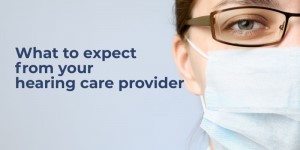Is it safe to see a hearing care provider during the pandemic?
Contributed by Joy Victory, managing editor, Healthy Hearing
May 14, 2020
If you’ve been putting off seeing a hearing care specialist while sheltering at home during the COVID-19 pandemic, that’s understandable. Many Americans have chosen to delay non-emergency medical care while waiting for things to improve.

At the same time, keep in mind that untreated hearing loss is not benign, and the longer you put off getting help, the more it can impact your personal well-being, health and relationships.
While often dismissed as benign, hearing loss—even when very mild—is linked to loneliness, social isolation, cognitive decline and depression, among other problems.
The good news? Colorado Hearing has been re-imagining patient care and office protocols to ensure your safety.
What to expect from Colorado Hearing during the pandemic
- When possible, appointments are conducted via telehealth.
- In-person appointments are being booked with approximately 15-minute gaps to allow staff to disinfect rooms between patients.
- When you arrive, a staff person screens you for signs of infection, including taking your temperature and asking about symptoms. Staff also are screened on a daily basis.
- The waiting room is closed.
- You are ushered immediately to the hearing exam room so you can’t linger in other rooms.
- You must wear a face mask, and all staff persons wear a mask, too. Staff continually uses sanitizer, washes hands or wears gloves during any direct patient contact.
- Removal of masks—which may be required for patients with profound hearing loss or other communication problems—is done at a safe distance.
- Familiar voice, speech discrimination is a key part of hearing health. A patient’s friend or family member will be asked to observe the same protocol.
- Curbside service is available for things like hearing aid repairs or battery pick-ups.
- Walk-in service is discouraged for purchasing supplies—supplies can be mailed instead or carried to your car curbside.
How you can do your part for safety
As the patient, you play a big role in keeping everyone safe, too. If you don’t feel well, stay home. During in-office visits, wear a mask and follow the rules accordingly.
Also, for telehealth appointments, expect a few technical hurdles at the beginning. It may take a few steps to set up, but generally it’s worth the time and effort it saves for everyone if you don’t need to visit the office for something relatively simple to adjust, such as a hearing aid setting.

